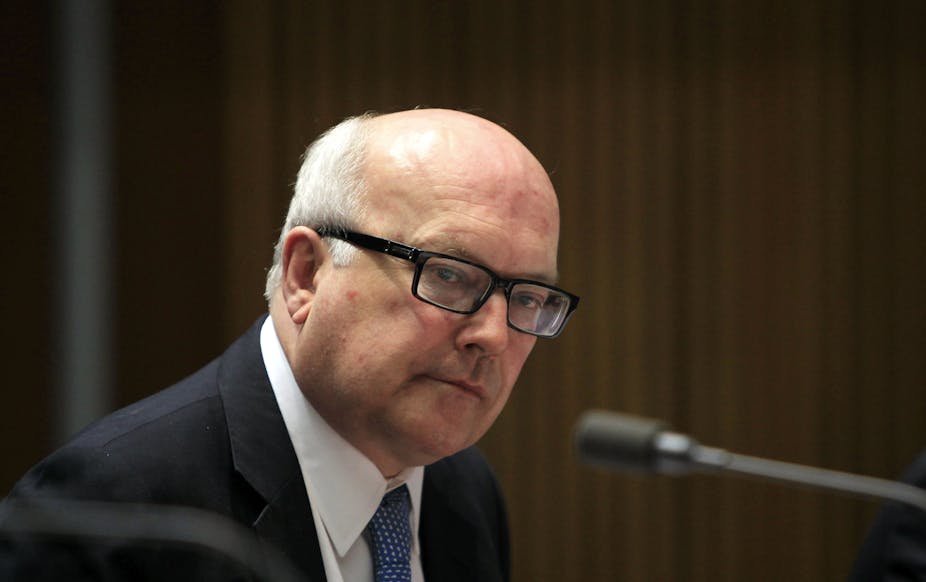Some time in the near future, federal attorney-general George Brandis will take a proposal to cabinet to amend or repeal the racial vilifications provisions (Sections 18C and 18D) of the Racial Discrimination Act.
Brandis does not believe that debate on the laws is about racial vilification. Instead, he argues that the issue is about the regulation of free speech. He claims to be concerned about vilification, but intimates vilification should be limited to words that would cause a reasonable person to undertake a criminal act against the targeted group.
Our new study of internet users has direct relevance to the possible changes. In 2012-13, the Australian Human Rights Commission received 192 complaints of racial hatred, of which 79 (about 41%) were about internet hate – all lodged under Section 18C.
The first results of our online survey, which is yet to be published, of over 2100 Australian internet users reveals a place where racism is rampant, according to our respondents. The findings presents some challenging data for those who propose to weaken the laws that prohibit the offending, insulting, humiliating and intimidating of people on the basis of race.
According to our survey, only 10% support making it lawful to offend without a legitimate defence (as provided for by Section 18D). Only 5% believe people should be totally free to intimidate up to the edge of criminality. This latter position is in line with the views espoused by influential free-market think-tank the Institute of Public Affairs (IPA) and News Corp columnist Andrew Bolt, who was found to be in breach of Section 18C in 2011.
Nearly 80% support laws against racial vilification. Close to 70% support laws against religious vilification.
These are not anti-free speech ideologues, as can be seen in the table below. Nearly half of those surveyed (47%) believe that freedom to speak your mind is more important than freedom from hate speech (neutral 32%; disagree 21%). An overwhelming majority, 73%, put the onus on websites such as Facebook and YouTube to report the complaints they receive about racism to the relevant authorities.

Our sample proved to be not dissimilar in its broader views and attitudes on race, ethnicity and racism to those revealed in previous studies of Australians undertaken by two of our research team, Kevin Dunn and Yin Paradies.
The responses were overwhelming on whether those surveyed supported or opposed retaining as unlawful the four criteria that underpin Section 18C. We had expected a more equal spread of opinions, given the claims made by those who wish to repeal 18C about community attitudes that support the move. In 2011, Brandis claimed that 18C:
… as presently worded, has no place in a society that values freedom of expression and democratic governance.
Currently, there is strong lobbying from the IPA and Bolt to remove the provisions that make certain forms of racial vilification unlawful: a civil, not a criminal matter. Brandis’ intentions – there are no proposals yet – have been met with opposition from a broad coalition of ethnic, religious and human rights groups. It appears Australians are comfortable with the current legislation, if our study is anything to go by.
Both sides of the debate argue principles as to whether the current framing of racial vilification should be made lawful. The arguments are best encapsulated by the public positions taken on the question by Human Rights Commissioner Tim Wilson, who argues that freedom of speech should trump all other freedoms. Race Discrimination Commissioner Tim Southphommasane posits that some protection from hate speech should trump absolute freedom of speech.
These are directly opposed principles. Yet, according to our research, Australians can cope with apparently contradictory positions so long as these are not pushed to an irrational extreme.
They like the idea that people have a fair amount of freedom to say what they think, to express their opinions. But they also indicate real concern for the more vulnerable and most often targeted groups in the community.
Australians distrust big websites to protect the interests of these vulnerable people, and they like the idea of some contemporary and focused regulation that would control vicious speech. The government has already indicated it plans to do exactly that in relation to cyber-bullying.
Do most Australians want one principle or a balance of principles to prevail? Can we reasonably determine a shared ethics of civility on language and cultural differences – and, if so, what might that entail?
Unfortunately, the federal government has so far given no sign that it is interested in pursuing a balanced way forward.

